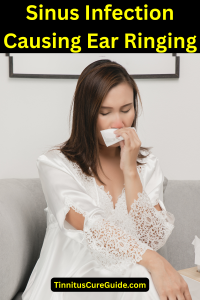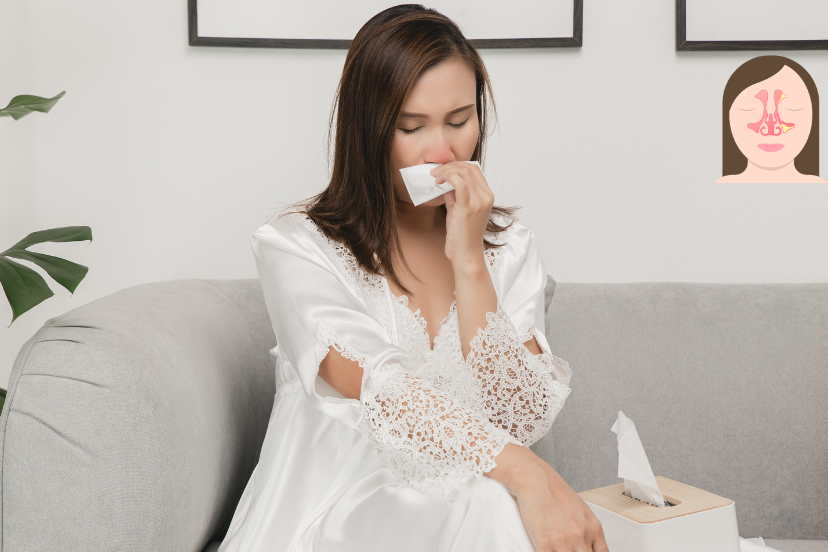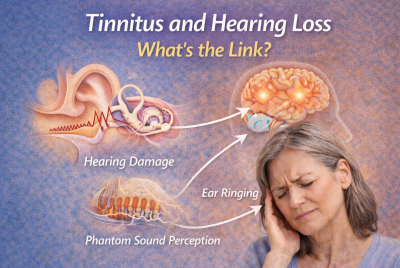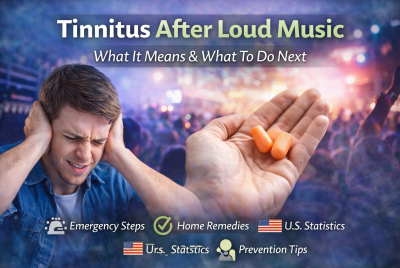Sinus Infection Causing Ear Ringing: What You Need to Know
If you’ve ever battled a sinus infection, you know the misery—clogged nasal passages, pressure behind your eyes, throbbing headaches, and difficulty breathing. But for many people, there’s another frustrating symptom: ringing in the ears. Whether it’s a high-pitched tone, buzzing, or whooshing sound, ear ringing during a sinus infection can feel overwhelming. This article explores the connection between sinus problems and tinnitus, explains why it happens, and offers practical tips for relief. If you’ve been wondering about a sinus infection causing ear ringing, you’ll find clear answers and treatment strategies here.
❓ Can a Sinus Infection Really Cause Ear Ringing?
Yes. A sinus infection can trigger temporary tinnitus (ear ringing or buzzing). The sinuses are located close to the ears and connected through tiny passageways called the Eustachian tubes. When these tubes become blocked due to infection or inflammation, pressure builds up in the ear canal, leading to ringing, muffled hearing, or even dizziness.
🔍 How Sinus Infections Affect the Ears
1. Eustachian Tube Dysfunction
When swollen sinuses block the Eustachian tubes, fluid and pressure can’t equalize properly. This causes:
-
Ringing in the ears
-
Muffled or distorted hearing
-
Ear fullness or popping sensations
2. Increased Pressure in the Inner Ear
Pressure imbalances affect the cochlea (the hearing organ), leading to false signals that the brain interprets as ear ringing.
3. Inflammation
Inflammation in the sinus and nasal cavities can spread to nearby structures, irritating the auditory system.
💡 Common Symptoms of Sinus-Related Ear Ringing
A sinus infection causing ear ringing often comes with other recognizable signs:
-
Constant ear ringing or intermittent buzzing
-
Ear pressure or fullness
-
Whooshing in ears when bending over
-
Dull headache or facial pain
-
Nasal congestion and postnasal drip
-
Dizziness or balance issues
🩺 When to See a Doctor for Sinus Infection and Ear Ringing
Most sinus-related tinnitus clears up once the infection improves. However, call a doctor if you notice:
-
Ringing lasting longer than 2 weeks
-
Sudden tinnitus in one ear
-
Severe ear pain or discharge
-
Hearing loss or difficulty understanding speech
-
High fever or worsening sinus pain
👉 These may indicate complications such as middle ear infections or chronic sinusitis that require medical treatment.
🏥 Treatments for Sinus Infection Causing Ear Ringing
Home Remedies for Relief
-
Steam inhalation – Helps clear sinus congestion and reduce ear pressure.
-
Saline nasal sprays or rinses – Flushes out mucus and allergens.
-
Warm compresses – Placed over the nose and forehead, they relieve sinus pressure.
-
Stay hydrated – Thins mucus, allowing sinuses to drain.
-
Elevate your head at night – Prevents mucus from pooling and worsening pressure.
Over-the-Counter Options
-
Decongestants (pseudoephedrine, phenylephrine) to reduce swelling in the nasal passages.
-
Antihistamines if allergies are contributing to sinus congestion.
-
Pain relievers (ibuprofen, acetaminophen) to ease discomfort.
Medical Treatments
If symptoms persist, a doctor may prescribe:
-
Antibiotics (for bacterial infections)
-
Corticosteroid nasal sprays
-
Procedures to drain blocked sinuses
🧑 Coping With Ear Ringing During a Sinus Infection
Even when you know your sinus infection is temporary, the ringing in your ears can still feel exhausting—especially at night when it’s quiet. While treating the infection is the first step, there are several ways to ease the discomfort and reduce how noticeable tinnitus feels.
-
Use background sound – A fan, white noise machine, or a tinnitus sound therapy app can help mask ear ringing and make it less distracting, particularly while sleeping.
-
Try relaxation techniques – Stress and tinnitus are closely connected. Deep breathing, progressive muscle relaxation, or guided meditation can lower anxiety and help calm the buzzing or whooshing in the ears.
-
Improve your sleep environment – Keep your bedroom cool, dark, and quiet, but add a gentle background noise to prevent focusing on ear ringing at night.
-
Stay active – Light exercise like walking or yoga improves blood circulation, which may reduce sinus pressure and tinnitus intensity.
-
Limit triggers – Reduce caffeine, alcohol, and excess salt, which may worsen ear buzzing sounds.
These small adjustments can make the difference between feeling overwhelmed and staying in control while waiting for your sinus infection to clear.
⭐ Can Sinus Infections Trigger Chronic Tinnitus?
Most of the time, ear ringing from a sinus infection is temporary. But if infections are frequent or untreated, they may contribute to chronic tinnitus by damaging the inner ear or causing ongoing inflammation.
If you already live with tinnitus, sinus problems can make symptoms worse, especially at night when everything is quiet.
🔊 Prevention Tips
Preventing sinus infections can go a long way in reducing the risk of ear ringing and other related symptoms. While not every infection can be avoided, small lifestyle adjustments can make a big difference.
-
Boost your immune system by eating a diet rich in fruits, vegetables, and whole grains. A strong immune system helps your body fight off colds and sinus infections more effectively.
-
Stay hydrated throughout the day. Proper hydration thins mucus, keeping your sinuses clear and less prone to blockages.
-
Use a humidifier, especially during dry U.S. winters or in air-conditioned environments. Moist air prevents your nasal passages from drying out, lowering the risk of sinus irritation.
-
Practice allergy control if you suffer from seasonal allergies. Over-the-counter antihistamines, saline rinses, or prescribed nasal sprays can help reduce inflammation that leads to blocked sinuses and ear ringing.
-
Prioritize ear health by avoiding loud noises and wearing hearing protection at concerts, construction sites, or sporting events.
By taking these proactive steps, you can minimize sinus issues, lower your chances of a sinus infection causing ear ringing, and protect your long-term hearing health.
❓ FAQs About Sinus Infection Causing Ear Ringing
1. Can a sinus infection cause ringing in only one ear?
Yes. If one side of your sinuses is more congested, you may feel pressure and ringing in just that ear. Persistent one-sided tinnitus should be evaluated by a doctor.
2. How long does ear ringing last after a sinus infection?
In most cases, the ringing goes away within a week or two after the infection clears. If tinnitus lasts longer, seek medical advice.
3. Can sinus infections cause permanent tinnitus?
While rare, untreated chronic sinus infections can contribute to lasting ear damage, which may increase the risk of chronic tinnitus.
4. Does ear ringing mean the sinus infection is serious?
Not always. Ear ringing often results from pressure and congestion. However, if ringing is sudden, severe, or paired with hearing loss, consult a doctor.
5. What’s the best natural remedy for sinus-related tinnitus?
Steam inhalation, saline rinses, and staying hydrated are safe, natural remedies. Combining these with relaxation techniques may ease both sinus pressure and ringing.
6. Can allergies cause both sinus infections and tinnitus?
Yes. Seasonal allergies often lead to sinus congestion and inflammation, which can block the ears and trigger temporary tinnitus.
7. Will antibiotics stop the ear ringing?
If your sinus infection is bacterial, antibiotics may clear the infection and reduce ringing. However, antibiotics don’t directly treat tinnitus itself.
🌟 Sinus Infection Causing Ear Ringing – Conclusion
A sinus infection causing ear ringing can be uncomfortable and disruptive, but in most cases, it’s temporary and improves once the infection clears. By using home remedies, managing congestion, and knowing when to seek medical help, you can find relief and protect your hearing.
👉 If ear ringing persists beyond your sinus infection, don’t ignore it—schedule a hearing check to rule out other causes.
⚠️ Disclaimer
This article is for informational purposes only and is not a substitute for professional medical advice, diagnosis, or treatment. Always seek the guidance of a qualified healthcare provider with any questions you may have about tinnitus, sinus infections, or other medical conditions.







